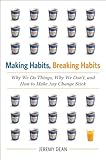|
In today's selection -- how long does it take to form
a new habit? You will often hear that it takes 21 days, but the real
answer is quite different than that:
"How long does it take
to form a new habit? ... I looked for an answer the same way most people
do nowadays. I asked Google. This search suggested the answer was
clear-cut. Most top results made reference to a magic figure of 21 days.
These websites maintained that 'research' (and the scare-quotes are fully
justified) had found that if you repeated a behavior every day for 21
days, then you would have established a brand-new habit. There wasn't
much discussion of what type of behavior it was or the circumstances you
had to repeat it in, just this figure of 21 days. Exercise, smoking,
writing a diary, or turning cartwheels; you name it, 21 days is the
answer. In addition, many authors recommend that it's crucial to maintain
a chain of 21 days without breaking it. But where does this number come
from? Since I'm a psychologist with research training, I'm used to seeing
references that would support a bold statement like this. There were
none. ...
"Thanks to recent
research, though, we now have some idea of how long common habits really
take to form. In a study carried out at University College London, 96
participants were asked to choose an everyday behavior that they wanted
to turn into a habit. They all chose something they didn't already do
that could be repeated every day; many were health-related: people chose
things like 'eating a piece of fruit with lunch' and 'running for 15
minutes after dinner.' Each of the 84 days of the study, they logged into
a website and reported whether or not they'd carried out the behavior, as
well as how automatic the behavior had felt. As we'll soon see, acting
without thinking, or 'automaticity,' is a central component of a habit.
"So, here's the big
question: How long did it take to form a habit? The simple answer is
that, on average, across the participants who provided enough data, it
took 66 days until a habit was formed. As you might imagine, there
was considerable variation in how long habits took to form depending on
what people tried to do. People who resolved to drink a glass of water
after breakfast were up to maximum automaticity after about 20 days,
while those trying to eat a piece of fruit with lunch took at least twice
as long to turn it into a habit. The exercise habit proved most tricky
with '50 sit-ups after morning coffee,' still not a habit after 84 days
for one participant. 'Walking for 10 minutes after breakfast,' though,
was turned into a habit after 50 days for another participant. ...
"Indeed, overall, the
researchers were surprised by how slowly habits seemed to form. Although
the study only covered 84 days, by extrapolating the curves, it turned
out that some of the habits could have taken around 254 days to form-the
better part of a year! What this research suggests is that 21 days to form
a habit is probably right, as long as all you want to do is drink a glass
of water after breakfast. Anything harder is likely to take longer to
become a really strong habit, and, in the case of some activities, much
longer."
Author: Jeremy Dean
Title: Making Habits,
Breaking Habits
Publisher: Da Capo Press
Date: Copyright 2013 by Jeremy Dean
Pages: 3-7
 Making
Habits, Breaking Habits: Why We Do Things, Why We Don't, and How to Make
Any Change Stick Making
Habits, Breaking Habits: Why We Do Things, Why We Don't, and How to Make
Any Change Stick
by Jeremy Dean by Da Capo Lifelong Books
Hardcover
|


No comments:
Post a Comment